

Discover more from My Goodness! From Jo Elvin
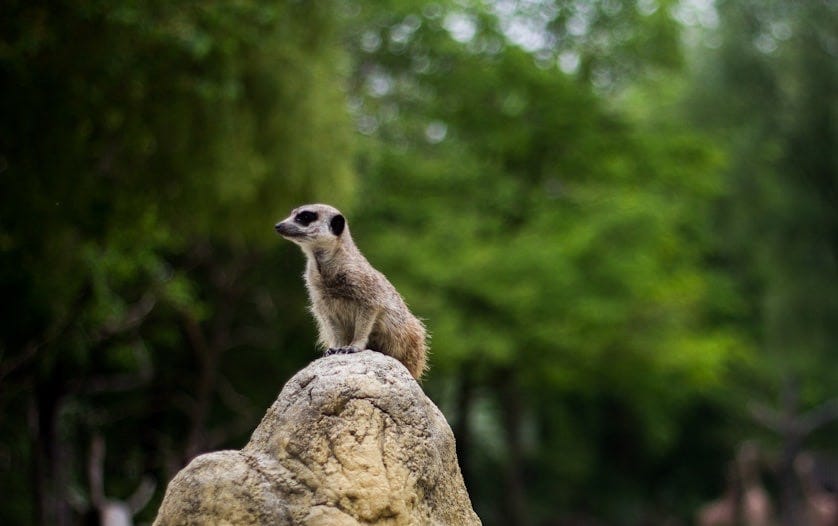
Have you ever had a moment where you realise your version of ‘normal’ is anything but? It happened to me over a casual drink with a Glamour colleague, Helen. We were talking about terrorism. Probably because it was June 2017, and we were trying to assess the safety - and taste - factors around pressing ahead with the Glamour Women of the Year Awards just days after the London Bridge atrocities. Talk turned to our darkest fears around the issue. This horrible event had been close to home. One colleague’s husband is an armed police officer who’d been a first responder. Our celeb booker, Chad, was evacuated from his London Bridge flat, unable to return during days of police investigations.
I told Helen that I thought about terror attacks every single time I got on the tube. She was very taken aback by this and said she rarely, if ever, thinks about it.
It was a real moment for me: the first time it occurred to me that I might be the only one whose thoughts and fears around the issue were obsessive. I started asking other people I trust and apparently it was just me.
‘I can’t believe I’m going to tell you this,’ I said to Paul McKenna. But there is one thing that I think might actually be a problem.’
Cut to about two years later when I was the editor of You magazine for the Mail On Sunday. The delightful randomness of my job meant that one day, I was offered a hypnotherapy session with Paul McKenna. Yes, the very famous hypnotist, author and behavioural scientist.

Obviously this tickled and intrigued me and I said yes even before I’d figured out why on earth I might want a hypnotherapy session with Paul McKenna. ‘He can help you with any issue you might have,’ said his lovely publicist Neil Reading, probably assuming I’d ask about quitting smoking or my outrageous shopping addiction.
I still didn’t know what I was going to ask him about when I knocked on the door of his West London mews house and heard the mighty woof from his adorable Doberman. I sat across from him in his study, our knees almost touching, and he asked me how he could help.
With his world famous hypnotist eyes seeming to pierce to the back of my soul, I suddenly felt like a massive letdown because I couldn’t think of anything amazingly interesting that I wanted help with. I don’t smoke. I enjoy my shopping addiction. Maybe I could just see if he could make me believe I’m a chicken for the hell of it?
And so, the only thing I could think of in that moment came blurting out. ‘I can’t believe I’m going to tell you this,’ I started. ‘But there is one thing I’ve realised might actually be a problem….’
I squirmed through explaining that I regularly lie awake at night worrying about getting on public transport the next day. That sometimes I see men standing by themselves on carriages wearing backpacks and switch carriages as soon as I can, or even get off and wait for another train. That I needed to take deep, long breaths as I approached the underground platform and just will myself to go through the barriers and not let this irrational fear actually win one single round. That every morning when I get dressed, I ask myself if I can run in the shoes I’ve chosen, or at least kick them off quickly. That I also lie awake at night worrying about my husband’s and daughter’s train journeys. And that I think about this, every damn day and night.
Mercifully, he didn’t react as if he was looking at a crazy person. We chatted for a while as he tried to delve into what might be the root of this. And when I said, Oh actually, I was in downtown Manhattan on the morning of September 11, 2001, I don’t remember exactly his response, but the jist was, ‘Well.. duh!’
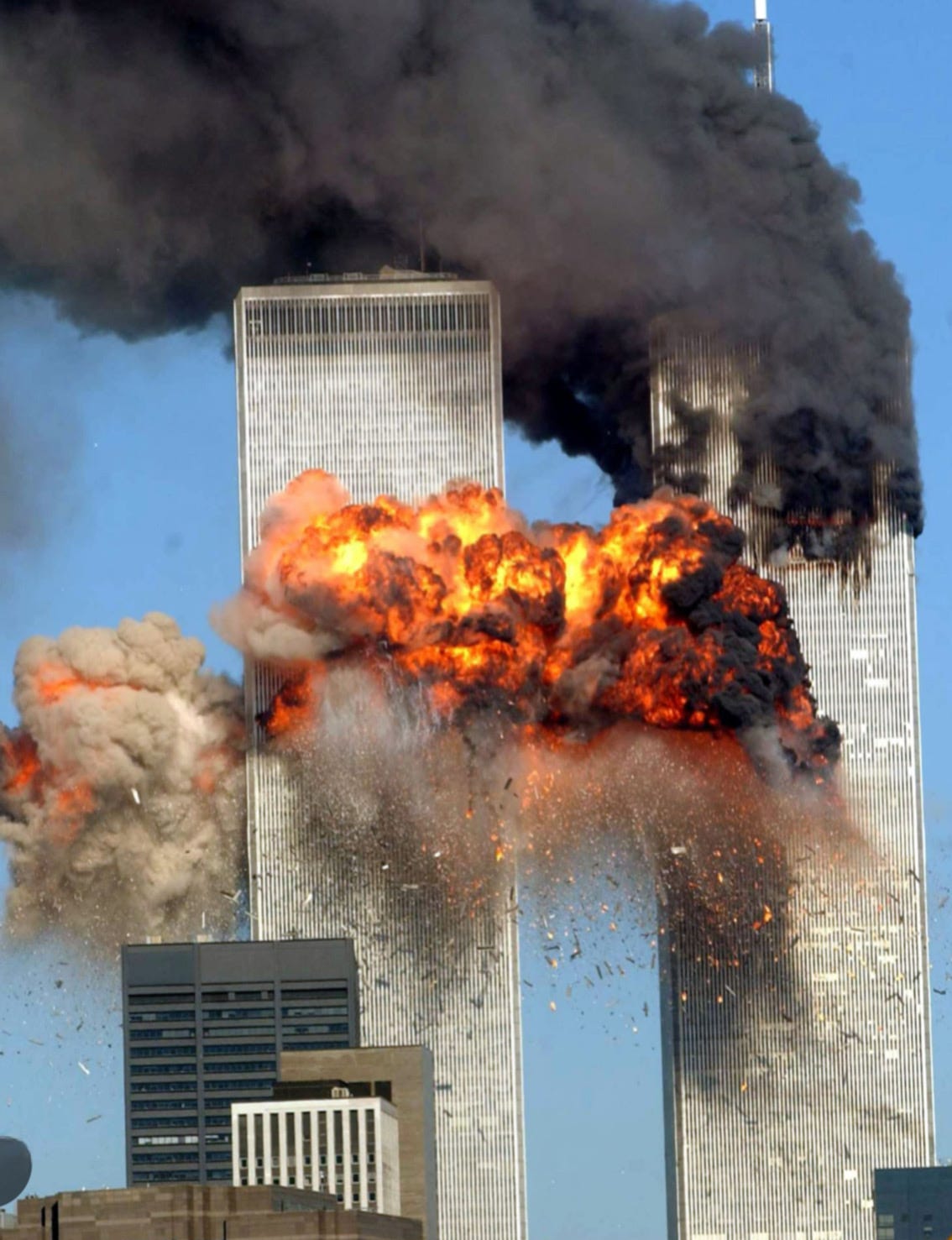
He talked about PTSD which I instantly batted away. Post Traumatic Stress Disorder is something that happens to soldiers who’ve seen combat, or someone who’s been violently attacked or for those who managed to escape the exploding Twin Towers on September 11. Not for people like me who were just, you know, nearby. I would never pretend that my experience of that day was anything like proper trauma.
But then Paul explained something that made a lot of sense. It sounded to him as though my body had had its primal response on that day - fight or flight, they call it don’t they? - and it was now stuck in that mode. Which is the basic definition of PTSD.
I started to understand myself in a whole new light. No, I wasn’t hurt on September 11. I didn’t lose anyone. But I was in the grip of some form of latent stressors from it all. And that made sense to me, because to this day I can remember how very deeply the whole thing affected me.
I thought to myself: Are we breathing in death right now?
There was the initial confusion and fear and the surprisingly slow dawning realisation that this was an act of war, not some sort of freak accident. Social media and smart phones were not a thing, so we were piecing together information at the slower rates of the day. I remember being in the shower at 8.45am and the shower head sort of shuddering back and forth a few times and my first thought was, ‘My god, I am more hungover than I thought.’ (It was Fashion Week and the night before was a Marc Jacobs party that was one of the best nights I’ve ever had.) I realised later it was from the impact of the plane hitting the first tower a few blocks away.
It was so much bizarre information to process in real time. One major memory for me: Sitting in my 9th floor hotel room, glued to the news and suddenly thinking, ‘Shit, there might be more to come, maybe you should not be up high in a building.’ So I made my way to the hotel lobby. As the elevator doors opened on the ground floor, the scene was straight out of a disaster movie: swarms of people crashing through the doors of the hotel, looking wide-eyed and panicked, lots of screaming, yelling, big clouds of dust blowing in with each wave who made it in. While I’d been in the lift, the second tower had come down.
I found the rest of the Glamour fashion team in the lobby and we just stood around, looking at each other in disbelief, fretful because our Nokia bricks would not put our calls through to loved ones in London. I think it was actually a government directive to just shut down the phone networks which makes sense, but it fueled a lot of panic on both sides of the Atlantic. We did not know what to do with ourselves and, after an hour or so of just basically saying, ‘What the fuck?’ back and forth, we noticed that the bar across the street was open.
At 11am, and because there really was nothing to do, we ordered wine. We ran into the actress Selma Blair, who I’d interviewed the night before for the mag. She was wandering down the street looking dazed, having just tried to give blood at a hospital and being turned away. Because the grim fact was that no one was coming out of those Towers let alone getting to A&E for treatment. Her eyes brimming with tears, I did the only thing I could and poured her a drink.
Sitting there, listening to the shellshocked CNN reporter on the bar TV, I looked around, still trying to make it make sense. The cars just abandoned, doors open, radios blaring in the normally busy street, the people walking around openly crying and hugging. (Earlier a man had grabbed my shoulders and yelled, ‘They’re trying to kill us all!’)
Suddenly I was aware of all the smoke and dust in the air. My thoughts turned to a feature I’d read in a magazine about terrorists and their efforts to weaponise contagions like Anthrax. Sitting with my team in that bar, I withdrew into a silent but very real panic attack. What might they have exploded alongside themselves in those planes? I thought to myself. Are we breathing in our death right now? Then I started arguing with myself. No, stop it, you’re being irrational, calm down, stop panicking. Breathe. Act normal. Drink your drink and stop being hysterical. This was going on a loop in my head when I heard the CNN reporter say, ‘Authorities are currently testing the air in downtown Manhattan for traces of Anthrax.’ I swallowed down on rising tears. I felt nauseous. I wasn’t being paranoid. I sat there, fully believing that we might all die an agonising death a week from now. ‘What’s Anthrax?’ asked Selma Blair and I felt so guilty when I told her and she cried again.
No one slept that night. It was such an unpredictable, unimaginable thing that had happened, what else that we couldn’t possibly dream up might go down next? I lay awake all night, ready to run if/when necessary. I got up from my useless bed at 5am and looked out the window, in time to watch a ghost stagger down the street. Although it wasn’t a ghost, just a man, wholly blanketed in white ash. I could see the shape of his fire helmet and uniform but he was paper white, from head to toe.
I know: NOTHING happened to me. But actually it was the days after the 11th that I think really did a longterm number on me. With all flights grounded, we were stuck there. Our hotel was in a zone closed to traffic because the smallest road vibrations were destabilising buildings near Ground Zero.
Walking around a silent New York is eerie enough, the kind of thing you only usually see in some zombie apocalypse film. But after a day of walking around aimlessly, trying to fill the time, and trying to find cafes and restaurants that still had enough food to serve, I’d go back to my hotel room and cry after walking past hundreds and hundreds of posters of faces plastered on sidewalks. The faces of ‘missing’ loved ones, but of course, we all knew exactly where they were. Or had been. Smiling, laughing photos of people’s husbands, wives, sons, daughters, brothers, sisters. It made me desperate to get home and hug my husband. Rumours circled that flights were out of the question for possibly a month. Typical me, the thing that really killed me was a poster that read: ‘Please listen out in your building for animals who sound in distress. It is likely that their owner has been killed in the attacks and they need help’, with the number of an animal rescue charity.
It’s hard to explain how it got into my gut. But it’s the most significant catastrophe that’s happened in my lifetime, I was there and immersed in the relentless coverage of it all. I saw some people react with rage. My emotional response felt like a deep grief. Just a kind of helpless sadness about how violent and cruel human beings could sometimes be. Physically, I felt that grief as if someone had scrubbed the insides of my gut red raw with steel wool.
Months after the event, I tried to describe how sad I felt about it to a journalist, who asked me if I’d been back to New York since the attacks. My comments got taken in isolation and ridiculed on some website under an article called ‘The real victims of September 11.’ It pissed me off so much. It’s exactly the kind of mockery that stops people discussing their mental health.
Months later I read someone quoted in a magazine article saying, ‘I ate a building that week.’ I knew exactly what they meant. Every day I could feel sandy-like grit in my mouth, grinding between my teeth. We were all ingesting the vapour trails of pulverised concrete, steel, fuel and probably other matter that I can’t bring myself to spell out here. Each night our clothes were steeped in the smell of ash.
I’ll keep stressing: I know nothing happened to me. But Paul McKenna helped me to be kinder to myself, because to say ‘nothing’ happened to me isn’t quite accurate either. What did happen is probably more common than I realise: I had a front row seat for something unspeakably horrific and because I am human it left a mark. It made me aware of what horrors are possible in this world. It triggered, on a primal level, a mode of shock and fear that my body simply got stuck in. It wasn’t me deciding I was a victim, but rather my adrenals. I would spend nearly two decades living like a human version of a meerkat, permanently upright, rigid and scanning my universe for expected threat. I honestly assumed you all did too, which is why it took me so long to consider that perhaps I had a problem.
Yes, I could swallow down on it and get on the tube and go about my business. But I’d be frightened every single time. So you probably have an idea of the state I was in when terror came to London. On July 7, 2005, I was at home because I was pregnant and 5 days overdue. I spent a couple of hours not knowing where Ross was and when I finally got hold of him I was still trying to convince him to just please fucking get home rather than keep trying to get to work in the midst of the city being suicide bombed. When my daughter was 5 days old, on July 21, there was another attempted tube attack which thankfully, failed.
Over the years the fear mutated and extended as my brain seized upon infinite possibilities. Every plane trip I took triggered insane levels of anxiety, often for weeks in the lead-up. I took my daughter to the O2 to see Little Mix when she was about 11 and later confided to Ross that I’d spent the night just looking around the crowd, unable to relax because I was mentally playing out all the horrific scenarios that seemed all too possible. ‘You can’t live your life thinking like that, you’ll go mad,’ he said, sensibly. Not long after, Ariana Grande had a concert in Manchester.
Of course, that threat is still there. The recent cancelling of Taylor Swift’s Vienna concerts was quickly followed by a terror incident in Germany a few days later. There will continue to be people whose murderous intentions pay off. But Paul McKenna changed my obsessive panicking about things I can’t control, for good.
So how did he do it? He used a technique called Havening. At the time I confess, I thought it was an awkward and embarrassing waste of time between two strangers. I was asked to tap my own shoulders repeatedly whilst I trying to remember exactly how I felt during those New York attacks. While I did this he made me watch his clicking fingers, my eyes swivelling left to right. I felt so uncomfortable and stupid. I thanked him for his time and for being so kind, but relieved when it was over. And now you’ve told Paul McKenna what a secret loon you are for no reason, I berated myself as I walked back to work.
About three weeks after that strange hour, I was on the tube and it hit me: I hadn’t thought about terror attacks. Not once had I done the deep, slow breath thing as I walked through the barriers.
‘Well…. bugger me,’ I thought. Turns out it was not a ridiculous use of an hour at all but a miraculous one. He knew what he was talking about, did that Paul McKenna. . Not only did he turn off my hysteria setting, he taught me a big lesson. We can, on the surface judge and rank human sufferings against one another. We can decide that my experience of September 11 is nothing to be moaning about when stacked against the horrors done to thousands of others that day. But if the body has opted for this primal, hardwired response, then trauma is trauma.
Don’t dismiss your emotional response to things as ‘nothing’ the way I did. Although I still never wear shoes I can’t run in. I’m simply too old for that shit these days.




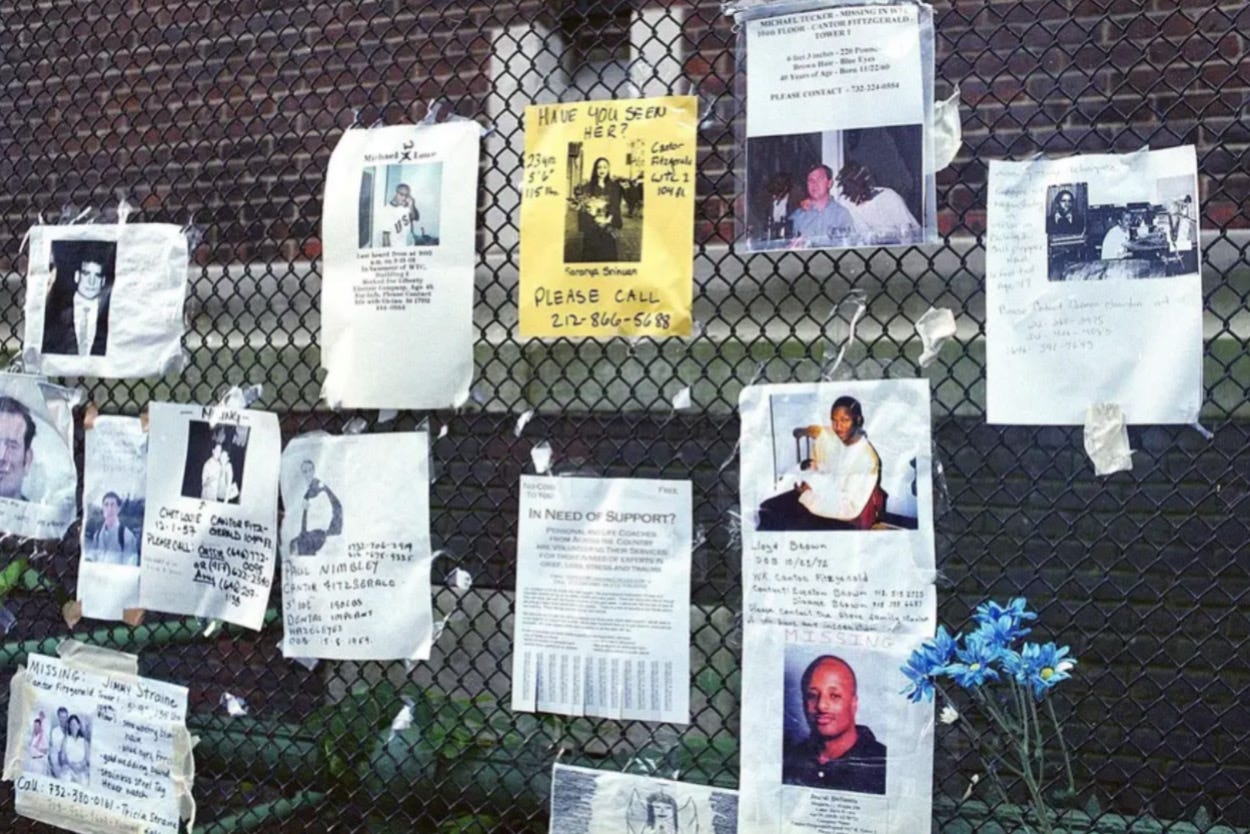





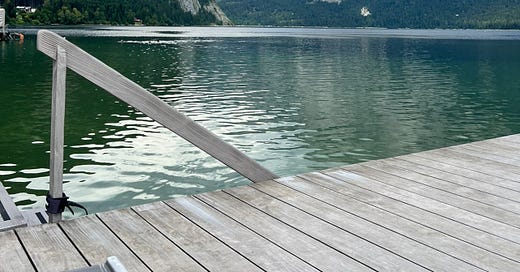

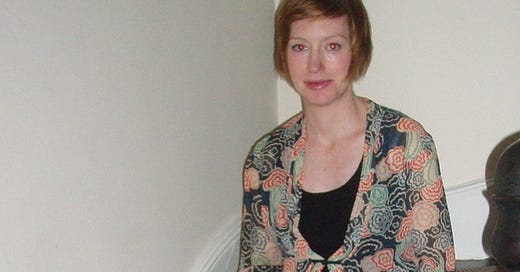


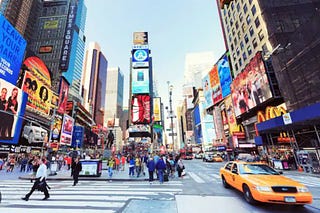
Jo, this is an incredible piece you have written. Emotional and raw, honest and brave... Goosebumps and prickly eyes throughout. If I may, I want to take the opportunity to tell you that, despite your insistence, this was not nothing, and you have every right to have been impacted in such a way. I am so pleased you saw Paul, experienced the Havening technique and the success it has brought. We are so quick to dismiss our 'silly' emotions, but it is we who will suffer more for doing so! Thank you for sharing the story x
Jo this is an incredible piece of writing. I want to nominate it for something but I don't know what. It feels important.